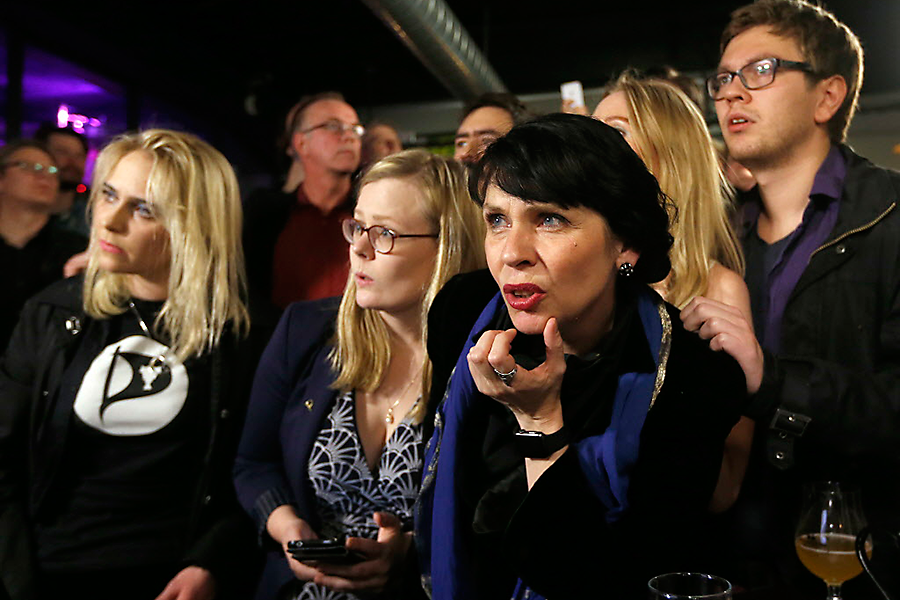Iceland's Pirate Party wins seats, but stops short of taking country's helm
The Pirate party stole the hearts of Icelanders, with its anti-establishment appeals of a “crowdsourced constitution,” Internet freedom, and the legalization of drugs.
But that wasn’t enough to win the general election Saturday. The Pirates tied for second, earning 10 representatives in the country’s 63-seat Parliament. The Conservative Independence Party, the junior partner in the current governing coalition, came in first with 21 seats, up from 19 last elections.
Pirate parties, like other nontraditional movements and candidates, have swept across Europe, as a wave of discontent over politics-as-usual and corruption washed over the continent and the United States. Consider “Brexit” vote and the rise of presidential candidate Donald Trump.
But Saturday’s elections are another example of how far along certain countries are in the shift from the old guard to the new. Some Icelanders have said they want change. They just aren’t sure if a party like the Pirates are the answer just yet.
“[The Pirates] believe in a good cause, but I don’t think they are ready yet,” Gunnar Andresson, a teacher, told the Associated Press.
The Icelandic Pirate party is one of more than 60 branches of a movement started in 2006 by Swedish internet activist Rickard Falkvinge. Mr. Falkvinge founded the party with the goal of ending internet copyright laws and using digital connectivity for civic engagement and to hold governments accountable. In Iceland, that promise took the form of rewriting the country’s constitution through crowdsourcing and rooting out corruption among the country’s elite.
Those promises propelled the party, which already holds three parliamentary seats from the 2013 election, to near the top of the polls. At the peak of its popularity in April, the party polled as high as 40 percent, according to The New York Times. But that number dropped as the polls started to come in late Saturday.
Still, the party’s leader, Birgitta Jónsdóttir, said Saturday’s results were a win.
“Whatever happens, we have created a wave of change in the Icelandic society,” she told a cheering crowd in Iceland early Sunday morning.
That change took two forms Sunday. Prime Minster Sigurður Ingi Jóhannsson announced his resignation on television that morning, after his party saw its seats shrink from 19 to eight. Mr. Jóhannsson succeeded Sigmundur Davíð Gunnlaugsson, who resigned in April amid accusations of conflicts of interest related to the leak of the so-called Panama Papers, which showed the hidden wealth of the country’s elite.
The second upheaval was the makeup of the new government.
The country’s left-leaning parties could potentially form a ruling coalition, since the liberal Regeneration Party has ruled out joining a coalition with current government establishment parties, including the conservative Independence Party. The Regeneration Party is expected to “play the role of kingmaker in the horse-trading” following the election, writes the New York Times’s Kimiko de Freytas-Tamura.
This upheaval, especially with the Pirate party involved, scares some in a country once dominated by conservative fisherman.
‘‘They'll make chaos,’’ fishmonger Marselius Gundmundsson told the Associated Press.
But others, like Birna Júlíusdóttir , a Reykjavik schoolteacher, wonder, ultimately, how radical the Pirates really are.
“It’s a little difficult to tell exactly where they are coming from,” Ms. Júlíusdóttir told the Christian Science Monitor’s Gordon F. Sander. “I think they want to present themselves as being radical, when they really are more about common sense, which of course I am all for.”
Some observers also previously said the rise of party is as much about general discontent.
“I think a chunk of the vote that have been parked with the Pirates has been dissatisfaction votes from people who did not want to vote for the old political parties,” Þórður Júlíusson, editor of Kjarninn, an Icelandic news site, told Mr. Sander.
This frustration has propelled other outside figures and movements in the United States and Europe. Mr. Trump and Democratic presidential candidate Bernie Sanders rose to the top of the polls at points during the presidential election. Mr. Sanders fell to Hillary Clinton, while Mr. Trump is now in a tight race with his Democratic opponent. The “Brexit” movement was also pushed forward with British discontent over its relationship with the rest of Europe.
In fact, some of those outside Iceland were rooting for the Pirate party so it could set a model for the rest of the world.
“We really want them to win,”, partly so that the next generation of US lawmakers can draw inspiration from Iceland for a better type of government, Winnie Wong, a strategist who created the hashtag #FeeltheBern, and spent a few months training the Pirates's tiny media team, told the Associated Press.
This report contains material from the Associated Press.






